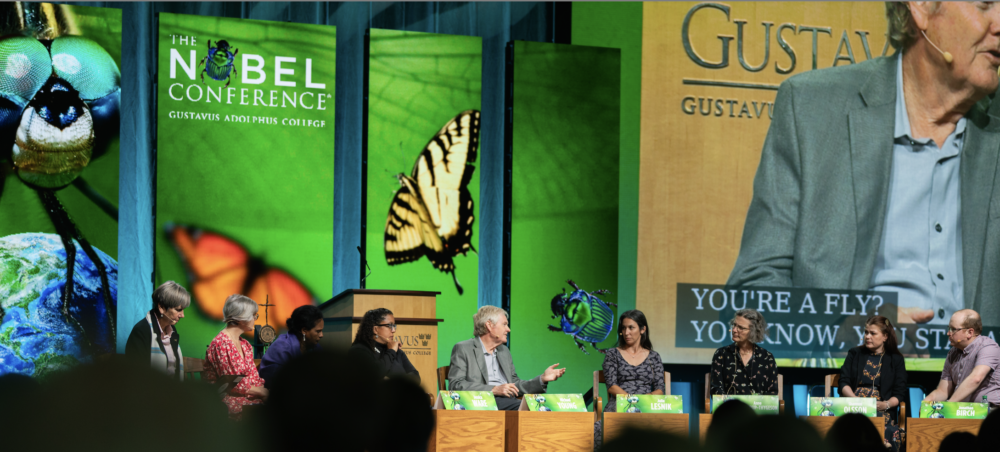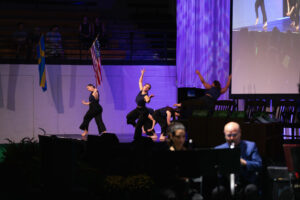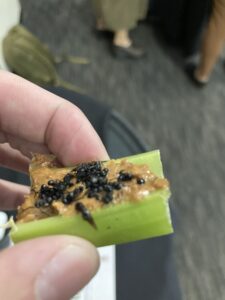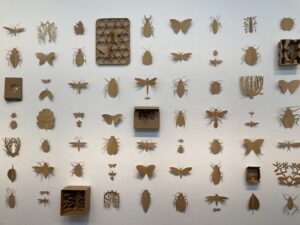
Nobel 59 guest speakers debate and discuss ideas during one of the post-lecture panels.
The Nobel Conference is a wondrous annual occasion at Gustavus Adolphus College. It is the only gathering in the United States that is permitted to use the Nobel name. World-renowned scholars provide novel information and education on a particular subject to the Gustavus student body and staff, high school students, alumni, and other interested guests. The audience, especially students, get to experience academic discussion and debate in a unique way that differs from the typical classroom lecture, and in a format that no other American university can boast.
And yet, Gustavus can sometimes have trouble getting students to attend. It’s early in the fall term, so students might be more focused on catching up with homework, or they might wonder why the event’s subject matters.
This year, I happened to be curious about the selected topic—insects and their impact on the world—and I wanted to see how interactive and approachable the conference was for Gusties. I decided to attend as much of it as I could. Would this be something I enjoyed, or would I have preferred, in retrospect, to sit in my room writing papers or stuffing my face with Swedish Fish while watching Netflix?
What I found is that the Nobel Conference is an opportunity for students to learn about different approaches to a subject, and it’s a compelling viewing experience in its own right. The lectures are straightforward and engaging, and there are all kinds of interludes that keep a student’s attention.
Right away, live jazz—not the expected classical pomp and circumstance—provided a surprisingly festive intro to the event. There are not many, if any, academic conferences that can match this opening. The music production was exceptional and hooked the audience with the insect-themed pieces, as well as with dancing lights and actual dancers (whoa) who ushered in the scholars and proceedings.
As a cellist with the Gustavus Symphony Orchestra, I later got to experience the lighting and staging from a different angle when we performed the prelude to one of the conference sessions. I can confidently say that this was quite different from our other normal orchestra performances. I later joked to my conductor, Justin Knoepfel, that it was the closest I had felt to performing at Target Center.
I also had several friends who tagged along with me to the lectures. At first, we weren’t sure if we would remain engaged, or if the scientific jargon would overwhelm us—after all, the conference concluded with a lecture from an actual Nobel Prize winner, Michael Young, who won the award in 2017 for his discoveries about circadian rhythms in fruit flies.
Our uncertainty quickly proved to be unwarranted. Guest speaker Jonathan Birch, a professor of Philosophy at the London School of Economics and Political Science, delivered a lecture on how insects process pain. One of my friends noted how approachable Birch’s lecturing style was and how he raised ethical considerations around killing insects that my friend—and many in the audience—previously hadn’t considered.
Later, my closest friend group and I attended a lecture by Julie Lesnik, an associate professor of anthropology at Wayne State University, about consuming insects as food. We all agreed that, despite some unfamiliar terminology in the talk, we could still understand and resonate with the discussions of food colonialism and other topics Lesnik raised.
Speaking of insects as food…there was a bug-eating reception. Yes, you read that right. Not lollipops shaped like crickets, but genuine dried crickets served like popcorn. There were also ants on logs (celery with peanut butter—pictured), and an entire brownie tray made with mealworm flour.
Not only was I enthralled by the prospect of eating insects, I was intrigued that it wasn’t the kind of thing that academic conferences normally attempt. I appreciated how creatively our Nobel organizers were thinking in setting up the two days of sessions and events, and I especially appreciated the opportunity to do something very new. (I mean, come on. Eating bugs! Seriously.)
With my student duties still pressing, there were many things that I didn’t have time to attend, including a packed and lively storytelling session centered around people’s memorable/harrowing/hilarious insect experiences. There also were breakout sessions with Gustavus professors about relevant topics, such as one about insects in literature and film and another from the Religion Department about the Bible’s perceptions of the insect world. There also was a student-only Q-and-A during which current Gusties were able to meet and spend time with all the guest speakers.
This was a conference that I wish I could have seen more of, and I would recommend participating in whatever parts of Nobel that intrigue you. (Next year’s topic is sleep, something we can all relate to.) You might not have time to attend the entire conference—though you can watch it live or later online. If you did attend it all in person, you might have five overdue papers. Maybe ten. But you’d also learn a lot about something new.
I found it extremely enjoyable to select my favorite parts and at least check them out. Otherwise, I never would have learned about the minds of insects, nor would I have eaten them. On that final note, I’ve included a photo of the insect-themed art exhibit in Schaefer that I found strikingly beautiful. See for yourself—and maybe check out Nobel next year.
###
Media Contact: Director of Media Relations and Internal Communication Luc Hatlestad
luch@gustavus.edu
507-933-7510


